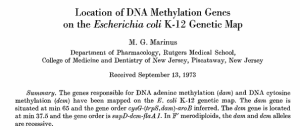Rick Van Konynenburg’s passing was very unexpected and unfortunate, not only for the community but because he had just agreed to review a draft book on the Gut Bacteria model that I was working on. I had sent him a draft just 7 days before he passed.
In terms of recent papers, this [2012] paper appears to support the premise — especially if you consider the frequent co-morbid conditions of IBS and IBD with CFS.
“The gut microbiota, the intestinal mucosa and the host immune system are among the large biological networks involved in the development of inflammatory bowel disease (IBD), which includes Crohn disease (CD) and ulcerative colitis (UC). Host genetics and environmental factors can significantly modulate the interactive relationships among these biological systems and influence predilection toward IBD… Epigenetic changes, such as DNA methylation (the methylation of cytosines followed by a guanine in CpG dinucleotides) can be modified by environmental influences [gut bacteria]. Mucosal DNA methylation can also react to changes in the commensal microbiota, underscoring the intercalating relationships among the large biological systems involved in gastrointestinal disorders.
A [2000] paper on IBD states a situation of suspected infections factor similar to that seen with CFS: “A great number of bacterial and viral factors has been suspected of being infectious factors in IBD, mostly in CD. Mycobacteria, Yersinia, Campylobacter, Clostridium, Clamidias, etc. as well as bacteria and some viruses such as herpes and rotavirus and the primary measles virus. None of them has been proven as a real and exclusively pathogenic factor.”
Returning to CFS specifically, from the Aussie 1998 conference report, we know that escherichia coli populations is very low in CFS patients. E.Coli produces NADH, and this would account for the benefits of NADH supplements for CFS that have been reported from several studies.
E.Coli also impacts other metabolites. I did a query on PubMed for “Escherichia coli Methylation” and got 3244 hits today!
One paper from 1973 was very interesting:
So E.Coli is involved with methylation!
Another study from [1972] found that Bacillus subtilis is also involved. B.subtilis was used in WW2 to treat dysentery (as was E.Coli Nissle in WW1). It should be noted that the use of such fell out of favor with the introduction of antibiotics. It is very interesting to note that Nattokinease is produced by a member of B.subtilis family (Bacillus subtilis natto).
My conclusion is that methylation issues in CFS could be explained as a result of a gut bacteria alteration. The methylation issues are down-stream from the gut (i.e. it would be much harder to argue that methylation issues causes gut bacteria alteration).
I find myself asking the same question that I ask of antibiotics use and CFS:
- When success occurs, are the antibiotics dealing with infections in the blood and tissues OR are they altering gut bacteria that allows re-activation of prior infections?
- When success occurs, are the change of diet etc. correcting/compensating the methylation issues OR are they altering gut bacteria that interfere with methylations issues?
“Chronic illness can be physiologically due to blocked biochemistry of methylation.” – the question is What is blocking the methylation? It could be DNA, but I believe the greatest factor (which happens to also be correctable!) is gut bacteria…

